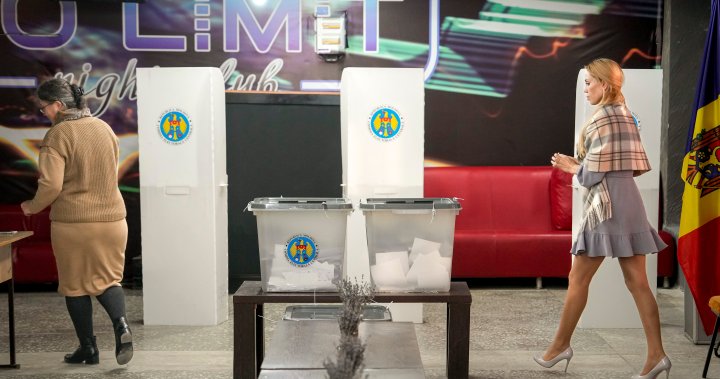Moldovans voted by a razor-thin majority in favor of securing the country’s path toward European Union membership, electoral data showed Monday, following a ballot that nearly caused a major setback for the pro-Western president, who accused “criminal groups” of trying to undermine the vote.
With 99.41% of the 1.4 million votes counted in the EU referendum held Sunday, the “Yes” vote stood at 50.39%, to 49.61% who voted “No,” according to the Central Electoral Commission.
The “No” vote had looked to be ahead right until the last few thousand votes were counted from the country’s large diaspora. A loss would have been a political disaster for the pro-Western government, which strongly supported the pro-EU campaign.
On Monday, President Maia Sandu reiterated claims that unprecedented voter fraud and foreign interference had undermined the votes, calling it a “vile attack” on Moldova’s sovereignty.
“Unfortunately, the justice system failed to do enough to prevent vote rigging and corruption,” she told a news conference. “Here, too, we must draw a line, correct what went wrong, and learn the lesson. We heard you: we know we must do more to fight corruption.”
Moldovan authorities claim that Moscow has intensified a “hybrid war” campaign to destabilize the country and derail its EU path. The allegations include funding pro-Moscow opposition groups, spreading disinformation, meddling in local elections and backing a major vote-buying scheme.
In Brussels, the European Union’s executive branch, the European Commission, said that its services had also noted Russian interference in Moldova, and it underlined its continued support for Moldova on its EU accession path.
“This vote took place under unprecedented interference and intimidation by Russia and its proxies, aiming to destabilize the democratic processes in the Republic of Moldova,” spokesperson Peter Stano said.

Stano told reporters that allegations of vote buying, the bussing of voters and disinformation are only the most recent forms of Russian interference, and that attempts to undermine Moldova and its support for the EU have been going on for months.
In the presidential race that was held at the same time, Sandu won the first round with 42% of the vote in a field of 11, but failed to win an outright majority. She will face Alexandr Stoianoglo, a Russia-friendly former prosecutor general who outperformed polls with around 26% of the vote, in a runoff on Nov. 3.

Get breaking National news
For news impacting Canada and around the world, sign up for breaking news alerts delivered directly to you when they happen.
By the time polling stations closed at 9 p.m. Sunday, more than 1.5 million voters — about 51% of eligible voters — had cast ballots, according to the Central Electoral Commission.
Cristian Cantir, a Moldovan associate professor of international relations at Oakland University, told The Associated Press that earlier polls might have “overestimated the pro-EU feeling” inside Moldova and the referendum would have failed to pass without votes from outside the country.
“It’s going to be particularly problematic because … it’s going to feed into narratives that are pushed by the Kremlin and pro-Russian forces,” he said.

U.S. national security spokesman John Kirby echoed Russian interference concerns this week, saying in a statement that “Russia is working actively to undermine Moldova’s election and its European integration.” Moscow has repeatedly denied it is interfering in Moldova.
In early October, Moldovan law enforcement said it had uncovered a massive vote-buying scheme orchestrated by Ilan Shor, an exiled pro-Russia oligarch who currently resides in Russia, which paid 15 million euros ($16.2 million) to 130,000 individuals to undermine the two ballots.
Shor was convicted in absentia last year of fraud and money laundering and sentenced to 15 years in prison in the case of $1 billion that went missing from Moldovan banks in 2014. He denied the allegations, saying the payments were legal and citing a right to freedom of expression. Shor’s populist Russia-friendly Shor Party was declared unconstitutional last year and banned.
On Thursday, Moldovan authorities foiled another plot in which more than 100 young Moldovans received training in Moscow from private military groups on how to create civil unrest around the two votes. Some also attended “more advanced training in guerrilla camps” in Serbia and Bosnia, police said, and four people were detained for 30 days.
A pro-Western government has been in power in Moldova since 2021, a year after Sandu won the presidency. A parliamentary election will be held next year.
Moldova, a former Soviet republic with a population of about 2.5 million, applied to join the EU in the wake of Russia’s full-scale invasion of neighboring Ukraine on Feb. 24, 2022, and was granted candidate status that summer, alongside Ukraine. Brussels agreed in June to start membership negotiations.
© 2024 The Canadian Press




